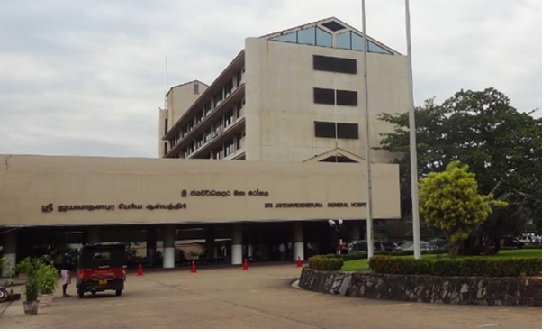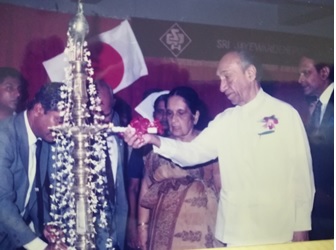‘HATRED CEASES NOT BY HATRED BUT BY LOVE,’-STORY OF SRI JAYEWARDENEPURA GENERAL HOSPITAL
Posted on September 16th, 2021
By Rohan Abeygunawardena
Incidentally, our memory flows exactly Seventy [70] years back to the ‘ San Francisco Peace Treaty Conference ‘ in September 1951.
D.S. Senanayake, the first Prime Minister of Ceylon (as Sri Lanka was then known) selected his young and able Finance Minister J. R. Jayewardene to lead the delegation from Ceylon to the conference. The latter made his historical speech on 6th September 1951, 11 days before his 45th birthday (he was born on 17th September 1906 and his 115th birth anniversary falls this month).

This great visionary defended the sovereign rights of Japan quoting the words of Lord Buddha ‘Hatred ceases not by Hatred but by Love’ (නහි වේරේන වේරානි) which allowed Japan to return to the international society after the World War II.
Twenty six years after the speech J.R. Jayewardene was the elected leader of Sri Lanka.
Sri Lankan economy was stagnating for quite some time when United National Party (UNP) under the leadership of J. R. Jayewardene, was elected in July 1977 with a massive 5/6th majority to the National State Assembly (with the introduction of a republican constitution in May 1972 name of the Parliament was changed). The development activities of the country was at a low ebb. The unemployment rate had risen to above 15%. Import controls and licencing was the order of the day. The multipurpose Mahawelli diversification programme considered as the keystone of the government’s economic development program planned in 1961 for 30 years was progressing at a snail’s pace.
The New Prime Minister and his government changed the constitution and introduced a system under which the President remained head of state but was given new executive powers as the head of government.
J. R. Jayewardene took oaths on 4th of February 1978 as the first Executive President of Sri Lanka.
In fact J.R. Jayewardene, first suggested a strong executive chosen by the people at a meeting of the ‘Ceylon Association for the Advancement of Science’ in 1966. This idea was again suggested by him when Mrs. Sirimavo Bandaranaike and her United Front Government were drafting the ‘1972 Republican Constitution.’ It had been ignored on both occasions.
In 1977, as the elected Prime Minister, J. R. Jayewardene said his first, second, and third priorities were to create employment opportunities for the people in general and youth in particular.
The new government wasted no time and embarked on a massive development programme to modernise the country. The accelerated Mahawelli diversification programme was initiated with a massive financial and technical support from Europe and Japan. Katunayake Export Processing Zone (EPZ) and Free Trade Zone (FTZ) were established to bring in Foreign Direct Investment (FDI) and to attract export oriented industries. The other objective of FTZ was to obtain modern industrial and technical know-how. The Greater Colombo Economic Commission (GCEC) was established to administer the FTZ.
Major liberalisation reforms were initiated that lead to far reaching changes in the structure and performance of the manufacturing sector in the economy. The manufacturing sector has become increasingly export-oriented, and it is no longer reliant on the fortunes of the traditional primary export industries to obtain required imported inputs.
J. R. Jayewardene (JRJ), the first Executive President of Sri Lanka was invited by the Japanese government for a state visit in 1979. This was a unique visit by a Sri Lankan head of state to Japan. He was well received with a 21 gun salute by the Japanese armed forces, the custom that they generally reserve for the Emperor. Thus, grateful people of Japan displayed their gratitude to the person who defended their country at the San Francisco Peace Treaty Conference in September 1951.
It was said that many Asian countries had attended the Conference with huge lists of demands for reparations from Japan. Japan was still struggling to achieve economic stability immediately after the Second World War and such payments, if made, would have affected her economy adversely.
Quoting Lord Buddha’s teaching ‘Hatred ceases not by hatred but by love’, Jayewardene urged other nations to forgo their demands for compensation and reparations and embrace Japan as a member of the international community.
When the participants heard J.R. Jayewardene calling for compassion and not compensation they withdrew their lists seeking compensation from Japan and thereby saving Japan from an economic disaster.
At the end of the tour President Jayewardene and Japanese Prime Minister Ōhira Masayoshi engaged in bilateral discussions along with their respective officials. Prime Minister referred to the great speech the President made at the San Francisco conference which cemented a strong friendship between Japan and Sri Lanka. Masayoshi then indicated that his government intended to give a special gift to remember and recollect the visit of Jayewardene and as a mark of respect for the great speech he had made at the conference, in 1951.
The conversation that took place between President Jayewardene and Japanese Prime Minister Ōhira Masayoshi about the gift was narrated by the president of Japan International Cooperation Agency (JICA) Mr. Takao Kawakami who visited the Hospital on an inspection tour in 2002. He happened to be the Secretary to the Japanese Prime Minister during President’s visit in 1979. JICA president was felicitated by the members of the hospital management committee. The writer was the Chief Accountant of the Hospital at that time and had the opportunity of listening to his narration.
‘What type of a gift are you thinking of?’ asked the President J.R. Jayewardene.
‘Something useful to help your modernisation programme, by way of a project grant, perhaps’ answered the Prime Minister.
President’s next quarry was ‘How large is the grant?’
‘It is immaterial’ said the Prime Minister.
President Jayewardene explained that his government had planned to establish an administrative capital in the ancient city of Sri Jayewardenepura, Kotte. Therefore, a modern hospital was useful for the new city.
Prime Minister Masayoshi inquired from the officials whether Japan had gifted a hospital to any other country. They confirmed that there was a modern hospital gifted to Thailand.
‘How big is that hospital? ‘asked the President and an official informed that it was a 1000 bedded hospital.
‘Make it 1001 bedded hospital’ quipped the President Jayewardene.
Amused Prime Minister Masayoshi asked ‘For whom is that extra bed?’
‘For me’ said the President.
Japanese government constructed a beautiful, salubrious modern hospital in a 24 acre plot of land called ‘Kumbi Kelle’ in Talapathpitiya, Nugegoda within three years. This state of the art 1001 bedded modern hospital was ceremonially opened by Ishimaysu Kitaagawa, the representative of Japan and the President Jayewardene on 17th September 1984. The day was President’s 78th Birthday.
President Jayewardene also ensured that the hospital was managed as a semi-governmental organisation under the Ministry of Teaching Hospitals. A board of management was established by a special act of parliament. His intention would have been to free the management of new hospital from the clutches of government bureaucracy. In spite of many requests made by prominent personalities of the era to name the hospital after the then President, he ensured that the hospital was named ‘’Sri Jayewardenepura General Hospital (SJGH).’’
The best tribute to SJGH was paid by present Army Commander General Shavendra Silva when he visited SJGH after the war in 2009. He was seriously wounded and unconscious taking part in the ‘Operation Liberation’ in Vadamarachchi in 1987 and airlifted to SJGH. When he regained consciousness he thought that he was in a ‘Five Star Hotel.’ Such was the tranquil surrounding of this Hospital. General also thanked the SJGH staff for saving his life with excellent medical care provided not only to him but also to many others who injured during the 30 year war. SJGH treated over 4000 war casualties from the defence forces and the police.
In 1999 when Health Ministry vote being discussed in the parliament, a prominent member of the opposition (now a minister) criticising the shortcomings of government hospitals said ‘These members do not realise the poor state of government hospitals because they only go to Sri Jayewardenepura General Hospital for treatment when they are sick.’ Feather on the cap of SJGH management!
Several foreigners whom I met during my tenure of office, told me that SJGH was one of the most beautiful modern hospitals in South Asia.
The Extra Bed was inside the spacious Presidential suite built at the entrance to the administrative block.
President Jayawardena never used the extra bed. But that bed was occupied by two prominent personalities, Minister of National Security Lalith Athulathmudali when he was injured in a grenade attack inside the Parliamentary Complex in 1987 and the first woman Prime Minster of the world Mrs. Sirimavo Bandaranaike in late nineties.
At the opening ceremony President J.R. Jayawardena appealed to the staff to look after the hospital in the same way they look after their own homes.
The employees followed his advice and considered SJGH as their second home.
President J.R. Jayawardena, retired from politics in late eighties accepted the invitation of Dr. J.B. Peiris, the Chairman appointed by Peoples ‘Alliance government of Mrs. Chandrika Kumaratunga, and attended the 10th Anniversary celebrations of the hospital held on 19th March 1995, as ‘Guest of Honour.’ The chief guest was the then Prime Minister Mrs. Sirimavo Bandaranaike.
President J.R. Jayawardena in his speech reiterated his appeal to the staff at the inauguration ceremony in 1984 to look after their institution well.
Then Minister of Health A. H. M. Fowzie appealed to the staff and management to keep politics out of hospital administration.
The quality health-care and the pleasing environment at this historical institution should be maintained and continued for the benefit of future generations. This task is now vested with the present and future management and staff.

Tenth Anniversary Celebration – Keep Politics Out